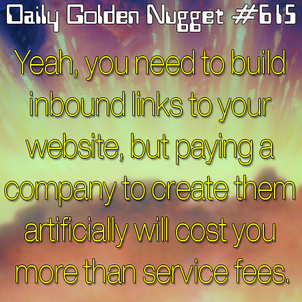 In general the usage of the name World Wide Web has been replaced by common vernaculars of web, internet, net, and even inter-web. The original World Wide Web name refers to how one website would hyperlink to another website. In the early years, around 1993 through 1997, that linking was done purely because someone liked your website and they wanted to link their site to yours.
In general the usage of the name World Wide Web has been replaced by common vernaculars of web, internet, net, and even inter-web. The original World Wide Web name refers to how one website would hyperlink to another website. In the early years, around 1993 through 1997, that linking was done purely because someone liked your website and they wanted to link their site to yours.Eventually the search engines started to count the number of links you had to your site as a measure of your popularity. Google was founded using a mathematical model of counting these links. That model became known as PageRank, named after Larry Page (no, really), the engineer who formulated it and went on to co-found Google.
In a few short years, many search engine optimization experts figured out that you could artificially inflate your PageRank and increase your website ranking in the search results. A huge business opportunity sprang from this as hundreds, maybe even thousands of low cost search engine optimization companies started selling services to create hyperlinks to your website.
You would always have the higher listing in Google's results as long as your website had more links than your competitor, and so many people hired link building companies to randomly create thousands of links around the internet every month. The easiest way to create links was by posting random comments on blogs. These random comments would sometimes look like gibberish, but other times it would be an innocent looking comment like "This was a good post, thank you. Please visit my site."
All these innocent looking blog comments were actually manipulating website ranking results in favor of the highest bidder. Companies were literally buying their popularity. This practice continued until 2005 when Google announced the creation of a new link tracking attribute called "nofollow."
As a website programmer, when you add the attribute rel=nofollow to the hidden code of a hyperlink Google will not count that link towards PageRank. Thus the nofollow became a way for blog owners to prevent abuse of their comments.
The use of nofollow appeared in common practice very quickly and anyone who paid for links was losing their ranking in the search results. Even to this day, 7 years later, some companies still sell Link Building services even though Google has made even more advanced strides to detect and invalidate links that are designed to manipulate website ranking results.
Paying for ads on a website is different than paying for links. Paid banner ads are designed to catch someone attention and get someone to click. In contrast, when you pay for a link it will usually appear inside the body of a paragraph somewhere, or on a long page of links.
So don't do it, don't hire a company specifically to build links for your website. It's just bad according to the search engines of today.








